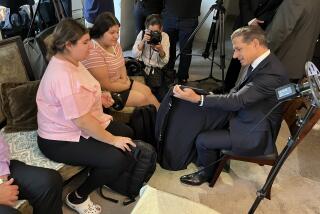Teachers Uneasy in Medic Role
- Share via
WASHINGTON — When a mother told teacher Joel J. Knox to “considerably” increase the medication he administered to control her 9-year-old son’s seizures, Knox wanted to verify the dosage with the boy’s doctor.
But the physician couldn’t be reached, and the mother was adamant, so the Merced, Calif., special education teacher followed her instructions. The boy suffered an overdose and had to be hospitalized.
Across the country, teachers like Knox say they are frustrated by growing obligations to provide medical care for children with conditions ranging from asthma and attention deficit problems to more serious disorders such as cerebral palsy and spina bifida.
No fatal or permanently damaging incident has come to public attention. But teachers worry about being accountable if serious harm comes to a child. The worry and care also distract from teaching, they say.
The situation has intensified as federal law has led more and more children with serious medical needs to attend regular public schools.
Not every school has a nurse. The number of full-time nurses ranges from 30,000 to 40,000 for about 85,000 public school buildings, according to estimates.
That means teachers, aides, administrators and even secretaries often feed children through tubes, help them urinate with catheters or make sure that “traches”--breathing tubes in throats--are clear.
Employees with various levels of training often hand out prescription drugs, give asthma treatments and test diabetic children’s blood sugar levels. Some give insulin shots.
With the confusing array of tasks, it’s hard to sort out who can safely do what. In 1990, a group of teachers unions, school nurses and the Council for Exceptional Children, which represents disabled children, issued some guidelines.
In Jefferson County, Ky., school officials follow the guidance of a nurses’ board when deciding whether a teacher or other employee can be asked to do a job, says Charlesetta Mayfield, the district’s health coordinator.
“When we asked staff persons to perform anything, we made sure we had a health-trained person to train them,” she said.
But that provided little comfort to Ann Thiemann, a high school teacher who was told to be prepared to clean the breathing tube of a 9th-grader if he became so choked he couldn’t do it himself.
Thiemann refused. Her classroom had no phone or button to call for help in an emergency, nor equipment for suctioning.
“What do you do with a child who is choking to death who has a permanent trache in a class of 30 kids?” she asked.
Two of five teachers assigned to the 9th grade eventually agreed to the training. But that offered even less solace.
“If the kid is choking to death, by the time I send my swiftest child to get the other teacher who is way at the other end of the school, it would have still fallen back on me,” Thiemann said. “I really was uncomfortable being responsible for his physical life.”
Fear permeates even the experienced. Although union-represented teachers and other employees typically have $1 million in liability coverage, it’s not always clear when they’re protected.
“If I train somebody, I’m saying they’re competent to do that,” said Rosemary Berckes, a registered nurse assigned to five school buildings in Cedar Rapids, Iowa. If someone makes an error, “I’m hauled in.”
Susan Gray, a special education teacher from near Anniston, Ala., spent four days this year accompanying a girl with spina bifida on a Washington field trip.
“I was totally in charge of her,” she recalled. That meant tending to needs such as diaper changes and catheterization. The whole time, Gray hoped nothing would go wrong. “That was very scary,” she said. “Her parents could have easily sued me.”
A few states have tackled the issue. Iowa protects teachers’ rights to refuse such assignments. Iowa and Illinois allow only nurses to give medication.
And Virginia this year passed a law granting teachers--but not other employees--the right to refuse starting a year from now.
A committee in Virginia will look at ways to find money for nurses.
More to Read
Sign up for Essential California
The most important California stories and recommendations in your inbox every morning.
You may occasionally receive promotional content from the Los Angeles Times.













